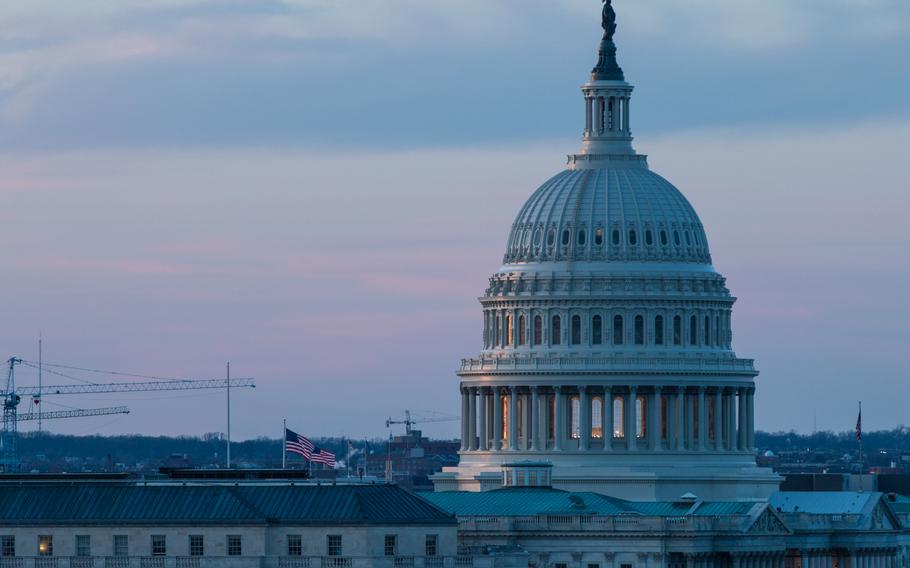
The U.S. Capitol as seen in 2017. (Michael S. Darnell/Stars and Stripes)
The House unanimously passed legislation Tuesday aiming to shorten the amount of time veterans wait for earned benefits, a process that takes an average of six years when a veteran is forced to appeal a claim with the Board of Veterans' Appeals.
But thousands of veterans are waiting much longer, according to the Department of Veterans Affairs.
The House voted 418-0 to approve the bipartisan HR 2288, titled the Veterans Appeals Improvement and Modernization Act of 2017. A companion bill in the Senate has yet to be voted out of committee. Both bills would create three ways for veterans to appeal their claims for benefits and their sponsors describe it as an overhaul of the decades-old system.
“I appreciate my colleagues on both sides of the aisle for supporting this long overdue legislation to help fix the VA’s broken appeals process and backlog,” said Rep. Mike Bost, R-Ill., one of the bill’s sponsors. “Our heroes deserve rapid access to quality care, and that begins with having their appeals decided in a timely manner. I encourage the U.S. Senate to take up this legislation as soon as possible.”
The VA helped draft the legislation and VA Secretary David Shulkin has repeatedly called on Congress to pass it.
In a statement accompanying the VA’s 2018 budget proposal released Tuesday, the department described appeals reform as one of its top legislative priorities. As the VA works through more pending and backlogged claims for benefits, the number of appeals is expected to increase. Approximately 12 percent of benefits decisions are appealed, according to the statement.
“While the appeal rate has remained steady over the past two decades, the appeals volume has increased proportionately to the increase in claims decisions,” it states.
The bill creates more options for how veterans can appeal their claims, including the ability to take their appeal directly to the Board of Veterans' Appeals or request a higher-level VA adjudicator to decide the claim. It also requires the VA to better notify veterans about the status of their appeals.
VA leaders have said it would take 18 months to establish the new system after the bill is passed.
Tuesday’s vote on the House floor was followed by the passage on voice vote of five other veterans-related bills:
• HR 1725 allows the VA to accept medical examinations from private physicians as evidence toward veterans' claims for benefits, rather than requiring them to come from VA doctors.
• HR 1329 requires the cost-of-living adjustments on veterans’ disability compensation to be increased the same amount as Social Security recipients.
• HR 1005 aims to help veterans stay in their homes by providing access to adult health care during the day for veterans who are eligible for nursing home care through the VA but don’t use it.
• HR 1545 urges the VA to follow laws requiring the agency to disclose to state monitoring programs when patients are prescribed controlled substances, including opioids. Because of inabilities in the VA’s information technology system, the department is only submitting information when a veteran receives a prescription, and not dependents who also get prescriptions from the VA.
• HR 1162 requires the VA to initiate a one-year pilot program for magnetic EEG/EKG-guided resonance therapy as a way to treat post-traumatic stress disorder, traumatic brain injury, military sexual trauma, chronic pain or opiate addiction. The procedure uses magnetic stimulation to improve brain function.
wentling.nikki@stripes.com Twitter: @nikkiwentling